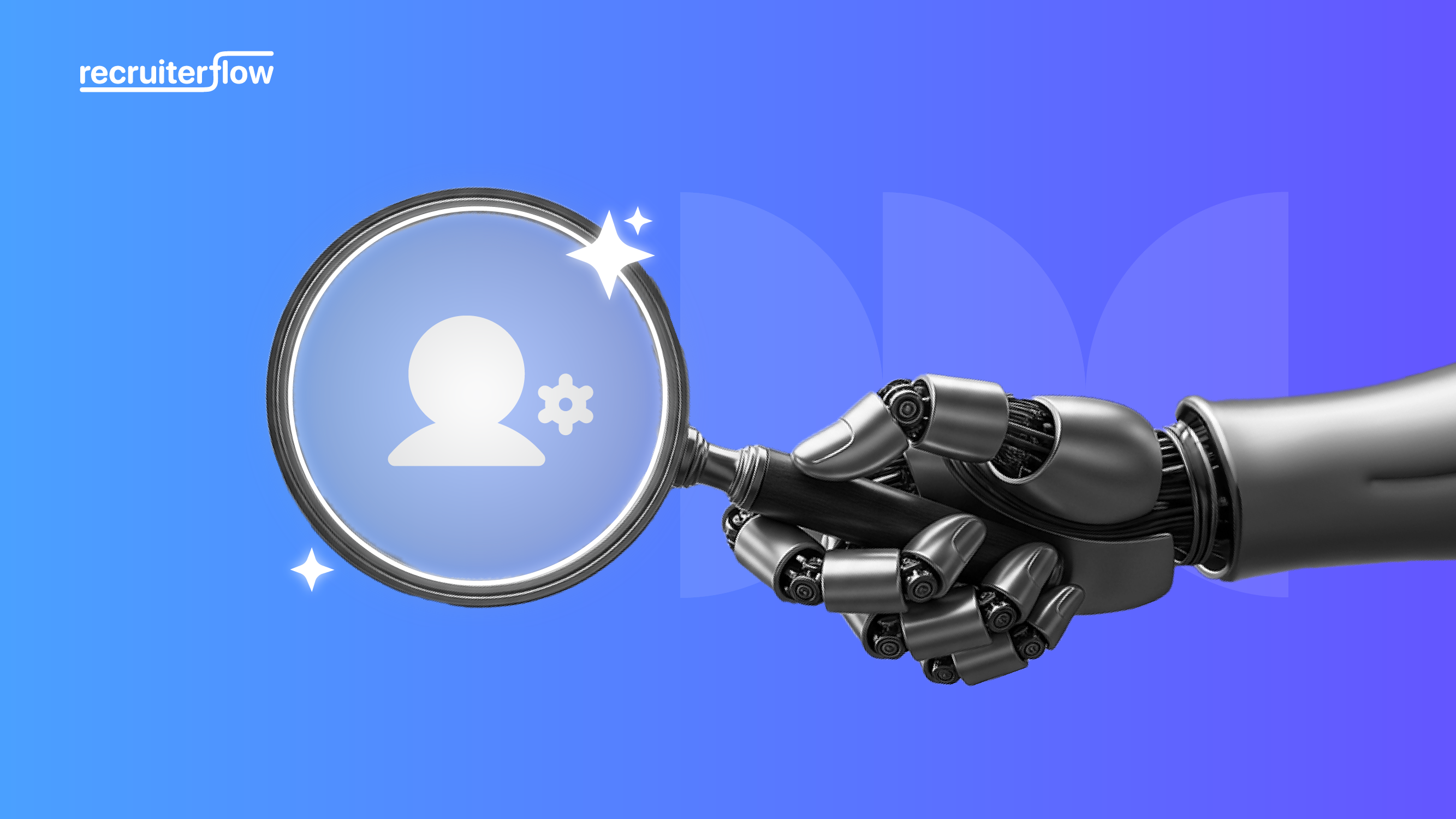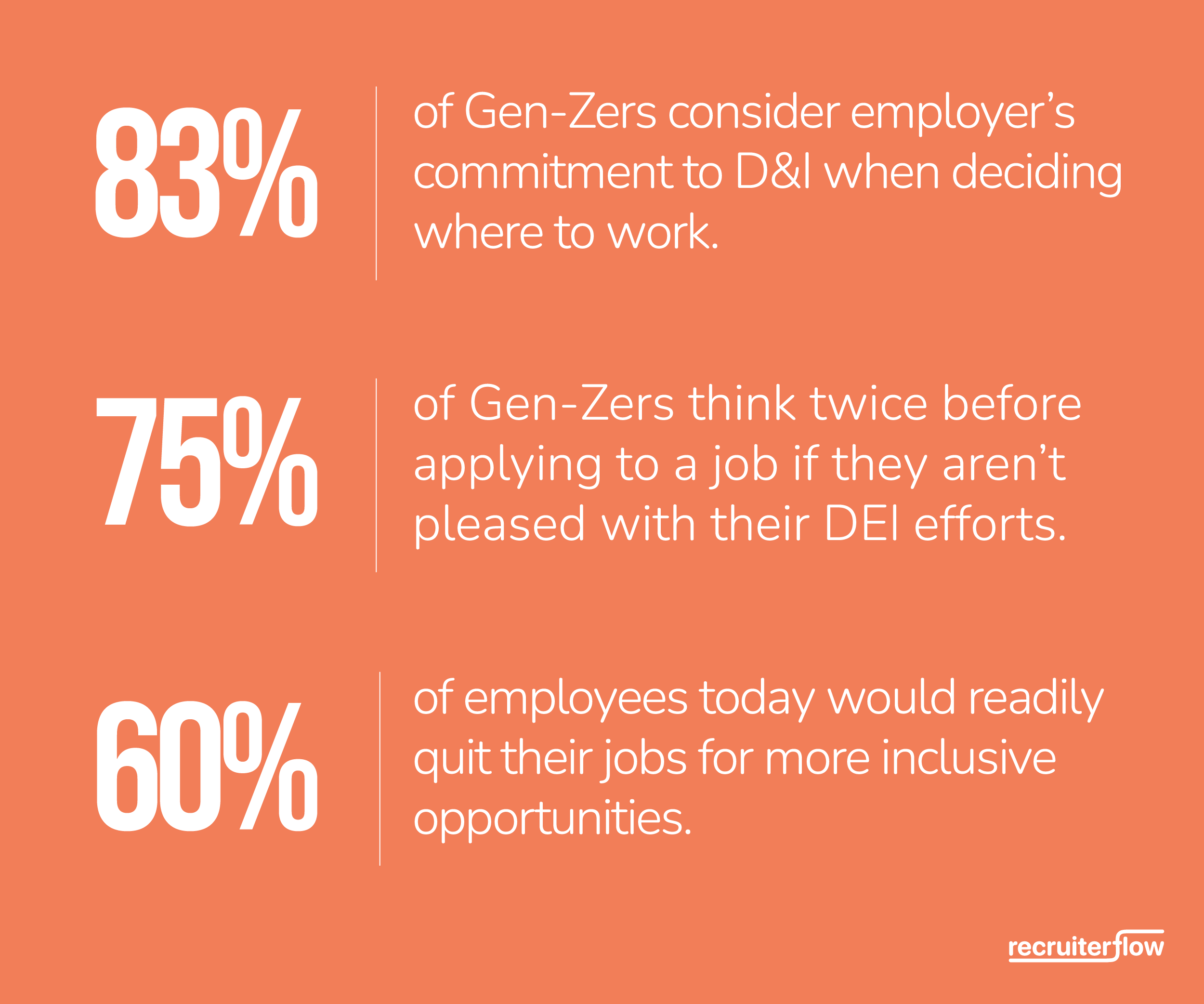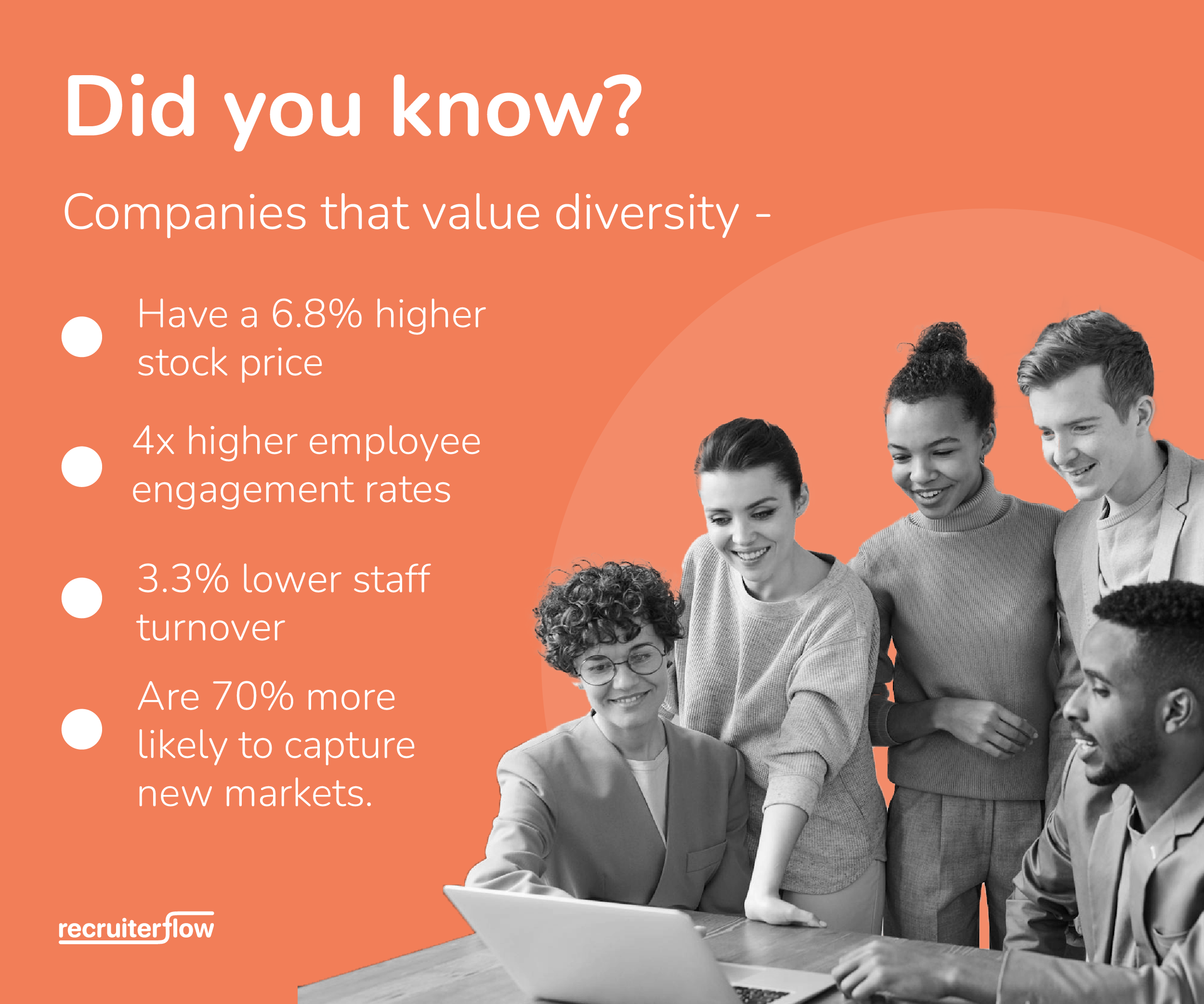
DEI Interview Questions and Answers Recruiters Should Ask

Looking to give your clients a competitive edge? Companies with strong DEI hiring practices build better teams, foster innovation, and create workplaces where everyone thrives. As a staffing agency, you play a critical role in finding candidates who are not only qualified but also passionate about fostering inclusivity and belonging.
The first step? Equipping yourself and your clients with the right DEI interview questions.
This article shares 120+ essential DEI interview questions staffing agencies can use to guide their clients and uncover candidates who can champion diversity, equity, and inclusion.
Be the strategic partner your clients need to transform their teams and champion DEI in every hiring cycle!
What Are DEI Interview Questions?
DEI (Diversity, Equity, and Inclusion) interview questions assess a candidate’s understanding, experience, and commitment to creating an inclusive and equitable workplace.
These questions help recruiters evaluate whether a chosen candidate aligns with an organization’s DEI values and practices.
Their purpose is to:
- Recognize and value “human” differences in race, gender, age, religion, ethnicity, sexual orientation, disability, etc.
- Ensure fair treatment, access, opportunities, and advancement for all.
- Create an environment where everyone feels welcomed, respected, and supported.
In 2025, as Gen-Zers (AKA the most diverse generation to date) account for 30% of the working population, more and more recruiters will include questions about DEI in their interview kits.

These recruitment statistics underline the importance of diversity recruiting practices, and why incorporating them into every aspect of your hiring process is non-negotiable.
Top DEI Interview Questions Recruiters Should Ask
Recruiters ask DEI-related questions during interviews to better understand a candidate’s ability, approach, and readiness to work with people from diverse backgrounds.
The more specific the questions, the better the hires—it’s as simple as that!
Here are the top 51 strategic interview questions to ask candidates across “diverse” categories:
General DEI Awareness and Commitment
- What does diversity mean to you, and why is it important in the workplace?
- How do you define equity, and how does it differ from equality?
- Can you describe an inclusive workplace environment? What makes it successful?
- Why is intersectionality an important concept in DEI work?
- What role does allyship play in creating an inclusive workplace?
- How do you encourage people to honor the uniqueness of each individual?
- How do you challenge stereotypes and promote sensitivity and inclusion?
- What steps do you take to ensure fair treatment for all employees?
- How have you incorporated diverse viewpoints and perspectives into decision-making?
- What is your approach to dealing with discussions about potentially difficult DEI topics?
You can also read our blog on recruitment best practices to enhance your hiring strategy.
Personal Experience and Advocacy
- Can you share a time when you advocated for a colleague or team member from an underrepresented group?
- Describe a time when you helped resolve a conflict between two colleagues. What actions did you take, and what was the outcome?
- Tell us about a time when you took steps to ensure everyone felt included. What actions did you take, and what was the outcome?
- What diversity, inclusion, or cultural competence training have you received, and how have you applied it in your work?
- Describe how your career has been enhanced by exposure to diverse people, places, or experiences.
Handling Bias and Difficult Situations
- How do you recognize and address unconscious bias in yourself or others?
- Tell us about a time when you addressed systemic bias within an organization.
- How do you respond to someone who makes an insensitive remark?
- Tell us about a time when you were challenged by others’ inappropriate or uncivil behavior. How did you handle it?
- Can you share an example of a time you were unable to tolerate another’s point of view? What happened, and how did you handle it?
Leadership and Influence

- How do you integrate DEI principles into your leadership style?
- How do you create psychological safety within your teams?
- What is your approach to mentoring and supporting underrepresented employees?
- How do you onboard new team members to foster inclusivity?
- Describe a time when you created an environment of honesty, inclusion, and respect for others.
Collaboration and Team Dynamics
- Describe a time when you collaborated with someone from a very different background. How did you approach it?
- Tell us about a time when you had to change your style to work effectively with someone from a different background.
- How do you ensure equitable workload distribution in your team?
- How do you create opportunities for collaboration among team members with diverse backgrounds?
- Tell us about a time when you helped resolve a conflict related to cultural differences.
Data-Driven Approaches
- What role does data play in informing your DEI strategies?
- Can you provide an example of how you used data to reduce bias or promote inclusivity?
- How do you measure the success of DEI initiatives?
Policy and Strategy
- Tell us about one or two specific things you’ve done to promote DEI in your workplace.
- How do you ensure DEI principles are implemented at all organizational levels?
- What steps would you take to address disparities in pay or advancement opportunities?
- How would you improve accessibility within the workplace?
- Describe how you handle feedback from colleagues with different perspectives.
Communication
- How do you educate coworkers or staff about DEI principles?
- How do you handle situations where a colleague’s behavior doesn’t align with DEI values?
- Tell us about a time when effective listening skills helped you in a difficult situation.
- Describe a time when you overcame a communication barrier.
Innovation and Action
- How do you celebrate cultural differences within your team or organization?
- How do you keep your DEI strategies current with industry trends?
- What steps do you take to promote inclusivity during team meetings?
- How would you address DEI challenges specific to underserved communities?
- What actions have you taken to support underrepresented employees in your current or previous role?
Personal Reflection and Growth
- What is the most challenging aspect of working with a diverse team? How have you addressed it?
- Tell us about a time when you learned something valuable from someone with a different background or perspective.
- Describe a situation in which you used multicultural skills to solve a problem.
- How do you stay informed and committed to DEI growth on a personal and professional level?
Also, check out our blog on reference check questions to enhance your hiring process.
Interview Questions for DEI-Specific Roles
Culture Manager
A Culture Manager assesses and aims to improve the organization’s cultural health by monitoring team dynamics and communications.
- How do you measure the cultural health of an organization?
- Can you share a specific instance where you successfully addressed a negative cultural trend in the workplace?
- What strategies do you use to ensure all employees feel included and valued?
- How do you encourage team members to bring in their unique perspectives?
- Describe your process for mediating conflicts that arise from cultural misunderstandings.
- How would you use feedback from employees to enhance workplace culture?
- What tools or metrics have you used to assess employee engagement and inclusion?
- How do you balance the needs of a diverse team while maintaining a cohesive culture?
- Have you ever implemented a program or initiative that improved collaboration?
- How would you handle resistance to cultural change within an organization?
Chief People Officer (CPO)
A Chief People Officer oversees workplace relationships and develops people-centric recruitment strategies to attract, retain, and engage talent.
- How do you integrate DEI into long-term people strategies?
- Can you share an example of a successful people-centric strategy you designed and implemented?
- How do you collaborate with other executives to align DEI initiatives with business goals?
- What steps do you take to foster an environment of trust and transparency?
- How do you measure the impact of your DEI-focused HR strategies?
- Describe a time when you resolved a significant workplace relationship issue.
- What’s your approach to addressing unconscious bias in hiring and promotions?
- How do you ensure equitable opportunities for growth and development across the organization?
- How would you redesign an HR process to make it more inclusive if given a chance?
- What role do employee resource groups (ERGs) play in your DEI strategy?
Diversity Coordinator
A Diversity Coordinator monitors and assesses the company’s DEI initiatives and collaborates with HR to recruit diverse talent.
They work on maintaining inclusive policies and fostering cross-departmental communication on DEI priorities.
- How do you assess the effectiveness of current DEI initiatives?
- Can you describe your experience with organizing DEI-focused events or programs?
- What methods do you use to identify and address barriers to diversity in recruitment?
- How do you ensure ongoing communication about DEI initiatives across all departments?
- Share an example of a DEI policy you’ve helped refine or implement.
- How do you handle conflicting DEI priorities from different stakeholders?
- What’s your process for staying updated on current DEI-focused recruitment trends and issues?
- Describe a time when you had to resolve an issue related to diversity or inclusion.
- How do you approach measuring the success of DEI-related events?
- What strategies do you use to engage employees in DEI initiatives?
Diversity Business Partner
A Diversity Business Partner integrates DEI strategies into various business operations.
They leverage data to drive DEI initiatives and provide support in creating and delivering annual DEI reports.
- How do you approach aligning DEI strategies with broader business objectives?
- Describe a time when you successfully incorporated DEI practices into a core business function.
- How do you use data to inform your DEI decisions?
- What’s your approach to building partnerships with external organizations to improve DEI efforts?
- Can you provide an example of how you engaged employees in a DEI program?
- How do you manage and present annual DEI reports to stakeholders?
- What tools or technologies have you used to track DEI progress?
- How do you collaborate with different departments to ensure DEI initiatives are effective?
- Describe a situation where you faced challenges implementing a DEI program. How did you overcome them?
- How do you balance employee satisfaction with corporate governance in DEI initiatives?
Vice President of Diversity, Inclusion, and Belonging (VP of DIB)
A VP of DIB leads resource allocation for DEI campaigns and represents the company’s stance on DEI publicly. They also establish ERGs and develop annual business plans for DEI recruitment and retention.
- What’s your process for developing and managing annual DEI plans?
- How do you measure the success of DEI campaigns?
- Describe your experience with establishing and managing ERGs.
- How do you represent your organization’s DEI initiatives in public forums?
- What metrics do you prioritize when assessing DEI recruitment and retention efforts?
- Can you provide an example of a successful DEI campaign you led?
- How do you ensure alignment between DEI programs and company goals?
- How do you address resource constraints in DEI initiatives?
- What’s your approach to managing stakeholder expectations for DEI outcomes?
- How do you foster a sense of belonging among employees from diverse backgrounds?

Learn more about Recruiterflow here!
Director of Diversity, Inclusion, and Belonging
A Director of DIB scales DEI initiatives across an organization and provides strategic advice to align these efforts with the company’s mission and values.
- How do you align DEI initiatives with a company’s core values?
- Describe your approach to scaling DEI programs across multiple departments.
- What’s your process for evaluating the impact of DEI strategies?
- Can you share an example of a time you empowered a team through a DEI initiative?
- How do you collaborate with business partners to ensure effective DEI implementation?
- Describe a time when you provided strategic advice that reshaped a DEI program.
- What steps do you take to ensure functional alignment of DEI initiatives?
- How do you address challenges in empowering underrepresented groups within your organization?
- What role does feedback play in your DEI strategy development?
- How do you prioritize competing DEI initiatives?
Chief Diversity Officer (CDO)
The Chief Diversity Officer leads the design and implementation of DEI strategies at all levels of the organization.
They ensure compliance with EEO regulations and work closely with executives to promote an equitable workplace.
- How do you ensure that DEI initiatives are integrated at each organizational level?
- What’s your process for addressing systemic barriers to equity in the workplace?
- Can you provide an example of a major organizational change you led to improve DEI outcomes?
- How do you collaborate with other execs to align DEI goals with business objectives?
- Describe your approach to complying with EEO regulations while fostering a proactive DEI culture.
- What metrics do you track to measure the effectiveness of DEI programs?
- How do you address the concerns of underrepresented groups in your organization?
- Describe a time when you initiated a core management practice change for DEI purposes.
- How do you maintain transparency and accountability in your DEI efforts?
- What’s your strategy for building a culture of continuous improvement in DEI?
Also Read: A new kind of family: Refugees in the modern workplace ||
Common DEI Interview Questions and Answers
Now that we have listed over 120 DEI interview questions to assess your candidates, here are some sample answers you can expect.
1. What does diversity mean to you, and why is it important in the workplace?
Sample Answer: “To me, diversity means acknowledging, respecting, and valuing the unique perspectives, experiences, and identities that individuals bring to the table. In the workplace, diversity fosters innovation by bringing together different viewpoints and approaches to problem-solving. It creates a richer, more dynamic environment where everyone has the opportunity to thrive, which, in turn, leads to better outcomes for the organization as a whole.“
2. How do you define equity, and how does it differ from equality?
Sample Answer: “Equity is about ensuring that individuals have the resources and opportunities they need to succeed based on their specific circumstances, while equality is about treating everyone the same regardless of their starting point. For example, in a training program, equity might involve providing additional resources to someone new to the field to ensure they can reach the same level of competence as others.“
3. How do you recognize and address unconscious bias in yourself or others?
Sample Answer: “By self-awareness and continuous education. I regularly attend workshops and take implicit bias tests to understand my own biases. To address bias in others, I facilitate open conversations and advocate the use of structured decision-making processes.“
4. Can you share a time when you advocated for a colleague or team member from an underrepresented group?
Sample Answer: “In a previous role, a team member from an underrepresented group shared concerns about being overlooked for leadership opportunities. I supported them by bringing their accomplishments to the attention of senior management, mentoring them on leadership skills, and advocating for their participation in a leadership development program. They were eventually promoted, which was a proud moment for both of us.“
5. How do you handle situations where a colleague’s behavior may not align with DEI values?
Sample Answer: “I believe in addressing such situations constructively and promptly. Recently, I observed a colleague make an insensitive remark during a meeting. I spoke with them privately to explain how their comment could be perceived as exclusionary, and we discussed ways to ensure their language aligned with our company’s DEI values moving forward.“
6. How do you create psychological safety within your teams?
Sample Answer: “I focus on building trust and fostering open communication by encouraging team members to share their thoughts without fear of reprisal. For example, I start meetings by inviting everyone to contribute their ideas and model vulnerability by sharing my own challenges. This has helped create an environment where everyone feels safe to speak up.“
7. What steps do you take to ensure equitable workload distribution within your team?
Sample Answer: “I monitor workloads closely to identify any imbalances and check in regularly with team members to understand their capacity. During a particularly busy quarter, I redistributed tasks to ensure no one was overwhelmed and provided additional support to those who needed it.“
These seven sample answers offer a framework for evaluating candidates’ responses to DEI-related questions.
Remember: Well-prepared candidates will always draw on specific experiences, demonstrate self-awareness, and articulate thoughtful approaches in their answers.
How to Evaluate DEI Interview Answers?
There is no right or wrong answer to any DEI interview questions. So, when evaluating them, all you have to do is look for these 4 key elements in your candidate’s response:
Authenticity – Their answers must be genuine and thoughtful.
Specificity – They must back their answers with clear examples.
Proactivity – Their answer must show that they took action and were prepared for it.
Alignment with Company Goals – This one should go without saying! No matter how good a candidate is if their values don’t align with that of the company you’re hiring for, it’s vain.
To ensure consistency in your evaluations, ensure you listen carefully, ask follow-up questions, and document every answer. You can use this FREE interview scorecard template for even better grading.
Conclusion
Asking strategic DEI interview questions is the best way to ensure your candidate’s alignment with the company’s inclusive policies and values. This article listed over a hundred questions that you can use right away to gauge your candidates’ overall fit and eventually make better hiring decisions.
Cheers to building a stronger, more equitable team!
Recruitment

